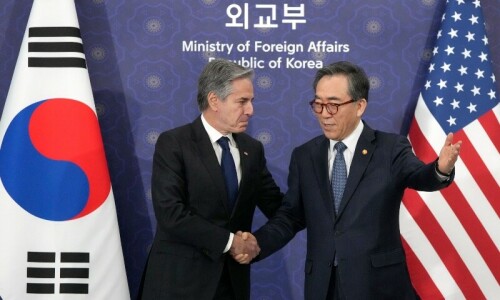THE shipping industry is making steady progress towards building Maritime Autonomous Surface Ships — also called MASS — which are vessels with the autonomy to make their operational decisions using artificial intelligence, eliminating the need for human intervention.
While the industry is experimenting with technological advancements at sea, countries are competing to develop futuristic ports (MASSPorts) to accommodate autonomous vessels. At the same time, international organisations, such as the International Marine Organisation, are working on a legal framework to govern future developments in this area.
The process of ship automation is gradual and categorised according to different levels of autonomy. At present, ships are manually operated: ie, they are under the command and control of a master and crewed by an average of 60-70 individuals on board. The second stage sees the automation of certain operations and functions of the ship, but the ship remains sufficiently crewed and under the command and control of a master.
The third stage envisions remotely operated vessels with a crew on board but under the command and control of a master stationed on land. The fourth stage would see remotely operated ships without crew on board: the ship will be remotely operated by a person on land without any crew member physically on board the ship. The last stage is a completely autonomous ship — the ship itself can decide and execute all actions and navigate the seas using artificial intelligence alone.
The need of the hour is to develop future-ready seaports.
In recent times, there has been a race to develop much bigger cargo ships — rather, giant cargo ships. If and when such giant ships are to sail autonomously, it could be easier for them to sail from end to end on the maritime highways, as compared to berthing and operating at traditional ports.
Existing ports and port operations may not be suitable for MASS, and necessary upgradation must be made to accommodate autonomous vessels. This will necessitate technological advancements, human development, infrastructure building and the development of an appropriate model for legal governance.
Pakistan is a link road between the sea and Central Asian countries. It is for the Central Asian countries to reap the economic advantages offered by Pakistan — a deep-sea, newly developed infrastructure, a cost-effective, shortest possible alternate route, etc. Additionally, the seaports of Pakistan and the abundance of available land for warehousing purposes can be well utilised for cargo in transit. This will curtail not only the transportation costs but also reduce the cost for cargo owners and handlers. China has already played the smart move by operationalising the China-Pakistan Economic Corridor to its benefit.
However, Pakistan is currently only offering seaports that are largely manually operated. The need of the hour is to develop future-ready seaports that can accommodate autonomous ships. In pursuit of developing MASSPorts, Pakistan can collaborate with other states, such as China, Norway, the Republic of Korea, and Denmark — countries that are already in the process of experimenting with MassPorts. The vision to develop and operate futuristic ports should be implemented in a sustainable and reliable manner, as this could provide Pakistan with a huge competitive advantage over nearby ports.
In terms of collaboration, technological advancement, legal and regulatory alignment with international instruments and guidelines, and provision of required infrastructure can be explored. The upgradation of facilities needs to be sustainable and efficient in terms of situational awareness, monitoring, communication and cooperation, development of a highly sophisticated and modern shore control centre, and computational logistics technologies and control strategies.
The development of MASS and MASSPorts will be gradual and challenging — technically as well as legally. Nonetheless, the world is transforming, and Pakistan needs to pace its development to compete at the global level. In fact, we must take the lead and contribute technically and legally to the development and framing of legal documents favourable to our requirements, rather than blindly accede to international instruments.
Pakistan should not overlook and waste the potential the sea carries for it. We must proactively take steps to be in a more competitive position by incentivising the establishment of sustainable and cost-effective freight and transportation capacities, including MASSPorts. Pakistan needs to understand that the sea is equally important and that investment in waters today can not only strengthen supply chain resilience but would allow the country to stay afloat even in bad weather.
An opportunity, if missed today by Pakistan and utilised by other competitive states, could prove devastating for our future and fruitful in the multiples for competing port states in the region.
The writer has an LLM degree in shipping law.
Published in Dawn, June 21st, 2022







































